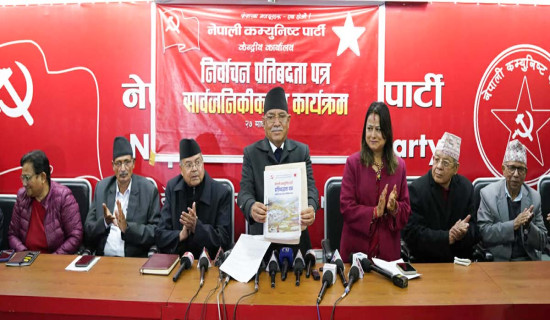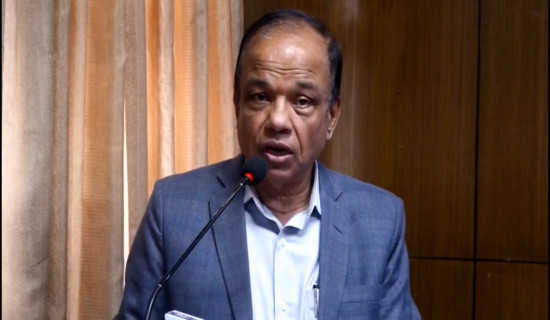- Wednesday, 11 February 2026
Negative Narratives Impede Development
While participating in public forums, many people express their concerns and worries that Nepal cannot be developed due to the policymakers' narrow attitude towards making the country prosperous. They often say there are no job opportunities, no industrial growth, no conducive environment for investors, and no significant agricultural production. In such a scenario, how can Nepali youths be encouraged to stay in Nepal? At the same time, the country is at risk of losing its demographic dividend. Such worries carry sentimental value, but it cannot be denied that the risk of spreading negative narratives among the people can persist for a long time.
Negative narratives distort reality and fuel passivity. If there is a half glass of water, many of us tend to say that the glass is half empty rather than half full. This kind of attitude prevents minds from thinking positively. The minds and hands of people, of course, have the power to make the country great and society prosperous, if they are tuned with a positive mindset and an honest commitment to fulfilling their duties for the greater good of the nation.
Push-Pull Factor
The push factor plays a negative role by spreading misleading pictures about the prevailing situation within the system. The government's main functions are to implement policies in such a way that the national interests are served and people's well-being is attained. Generally, the governance system is responsible for making things happen positively by providing justice and delivering services to the citizens while adhering to the principles of the rule of law, transparency and responsiveness. Enforcing the law impartially brings satisfaction to the general public and fosters a positive vibe, which helps ensure the effective functioning of the State. This sense of positivity stems from the truth and fairness embedded in better governance practices.
As a matter of fact, when the government effectively implements its decisions and follows ethical standards, citizens are likely to perceive it as honest and sincere, leading to a positive narrative about its governance. In contrast to this, poor governance gives birth to negative narratives, which are rooted in the ineffectiveness of government functions. When governance falters with mismanagement, negative narratives emerge. In essence, the quality of governance directly influences the public's perception of truth and shapes the overall narrative surrounding the government.
The pull factor basically lies in the external attractions that give people a space to make negative comparisons. Those who criticize Nepal by comparing it with developed countries should reflect on the fact that these countries have a long history of hardships before they made a gradual progress and became developed with the hard work of their own citizens, not by the effort of outsiders. In Nepal's context, the people themselves are responsible for uplifting the country economically and technologically.
Apart from this, there also lies an unseen motive pursued by some elements working covertly to destabilise the politico-economic governance system of the nation. These elements do not appear on surface rather work in disguised form using technology and other means to publicize their narratives. It is the government's responsibility to clarify and counter such narratives. Otherwise, Goebbels' doctrine on communication, 'a lie told once remains a lie, but a lie told a thousand times becomes the truth', may become a reality.
Three major negative narratives appear to have taken root in the minds of individuals, namely, blame narratives, despair narratives, and pessimistic narratives. These negative depictions are pervasive across social networks, painting a bleak picture of the country's present and future. Instead of contributing positively to Nepal's development and demonstrating better practices, those persons who do engage in negative narratives often spend their valuable time abusing political leaders, bureaucrats, security personnel, or others, thereby damaging their social reputation.
No one is above criticism in a democracy. Criticism is an effective tool to correct individual behaviour and governance mechanisms. But, it is equally important to ensure that such criticism is grounded in factual and constructive intent. It is also essential to note that the criticisms should be accompanied by feasible alternatives or solutions to the problems. Blame narratives, when not backed by facts, tarnish the credibility of those who propagate them and fail to offer constructive solutions. These days, a kind of negativity is gradually shaping detrimental mindsets among the new generation. When such perceptions take root, they threaten to erode the positive fabric of society and undermine the nation’s security.
Triangular relationship
There is a triangular relationship among negative narratives, social media, and rumour management. Rumors are spread from person to person. It emerges during uncertain times. They escalate from two primary sources: misinformation and disinformation. Misinformation is spread through platforms like YouTube and TikTok, which mislead viewers and create negative perceptions. Suppose a crime-related issue is under investigation, and if false claims are made about it, they could skew public opinion and generate unwarranted distrust, complicating the work of law enforcement and affecting the general public's understanding of the situation.
During the COVID-19 pandemic, social media platforms saw a surge in the spread of opinions and rumours. As people grappled with fear and uncertainty, misinformation proliferated, ranging from bizarre claims like 'drink whisky to prevent the virus', to 'drink hot soup made from Gurjo (Tinospora Cordifolia)'. Many individuals, fearful of COVID-19, began following such doubtful advice, which led to a significant number avoiding COVID-19 vaccinations.
Thus, negative narratives and rumours pose a significant threat to national security. These threats, driven by human psychology, can be more dangerous than other forms of crime. To maintain peace and security across the country, it is crucial for the government to effectively manage negative narratives and rumours.
(The author is a former secretary of Nepal government.)





-square-thumb.jpg)


-square-thumb.jpg)








